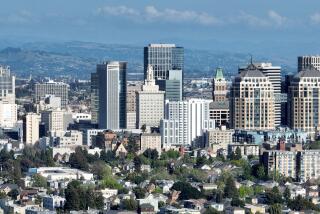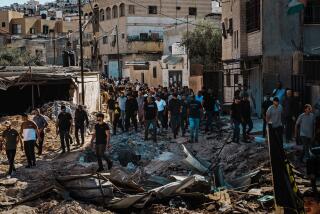Iraqi City on Edge of Chaos
- Share via
RAMADI, Iraq — Insurgents are killing and kidnapping government officials, police and Iraqi national guard members in an apparent campaign to destabilize this city, the capital of Sunni Muslim-dominated Al Anbar province west of Baghdad.
The rash of attacks threatens to eliminate the interim Iraqi government’s control over Ramadi, notwithstanding the presence just outside the city of thousands of U.S. Marines and Army soldiers who back the government’s authority.
The provincial governor’s three sons were kidnapped, and released only after he resigned. More recently, the deputy governor was kidnapped and killed, his body found this month. The president of the regional university and the provincial directors of the national sewage and communications ministries have also been kidnapped, and 10 contractors working for the United States have been assassinated.
Then there are the ominous posters that appeared on the walls of mosques a couple of weeks ago. Directed at Iraqi police and national guardsmen, they read, “Quit or we’ll kill you.”
The apparent aim is to make Ramadi into an ungovernable area like neighboring Fallouja, where insurgents have free rein. Ramadi and Fallouja represent 70% of Al Anbar’s population, according to U.S. estimates.
The erosion of order in Ramadi illustrates the success of the insurgents’ methods and the serious problems facing the interim government and its U.S. backers in maintaining stability in Iraq. It also threatens to thwart plans for a national election in January, at least in Al Anbar’s main cities. An election that omits key population centers in the so-called Sunni Triangle region would have greatly diminished credibility.
“We do not know who the attackers are or who is backing them,” said Ramadi’s acting governor, Mohammed Abid Awad. “Are they backed from outside? Nobody knows.”
Some victims have disappeared without a word; others have been assassinated, their bodies left on the roads. Still others have fled their jobs, afraid of suffering a fate similar to that of their co-workers.
“There’s been a lot of kidnappings, a lot of assassinations, just in the last couple of weeks,” said Col. Jerry L. Durrant of the 1st Marine Expeditionary Force, who oversees the coordination of the U.S. military with Iraqi security forces. “The government in Baghdad is not recognized by anyone in Al Anbar.”
Durrant said leaders of the Iraqi national guard do not want to meet him in public or travel in military vehicles. Many no longer wear their uniforms for fear of being identified with the interim government’s security forces.
Ramadi is not yet lost, but it is teetering. The Marines, aware of what is at stake, are trying to back up the local government. But they are hamstrung, because taking too visible a role could endanger the lives of Iraqi officials. Working with the Army, Marines are also trying to undertake small reconstruction projects they can complete quickly -- an approach they hope will make a difference in neighborhoods still open to the American presence.
Unlike in Fallouja, where U.S. troops within a hundred yards of the city draw fire, there are areas of Ramadi where Marines and soldiers dismount from their vehicles, talk to residents and respond to their concerns.
“Ramadi is a much more benign environment,” said Lt. Col. Mike Cabrey, who runs an Army artillery unit stationed in Ramadi. “I’d like to say it’s the civil affairs work we’ve done that’s made a difference.”
Between $8 million and $10 million has been spent in the greater Ramadi area, he said.
It may also be the hard work of Cabrey and fellow soldiers in a few discrete neighborhoods. Although he is an artillery expert by assignment and training, Cabrey has taken it upon himself to become deeply involved with projects that provide a combination of money and personal outreach. He visits the ongoing work efforts three times a week, so he maintains a relationship with the people his unit is trying to help.
Regardless, the U.S. military’s grip seems tenuous, the insurgency is persistent, and it appears that the troops face an uphill battle to maintain the bonds they have forged with the community.
As a provincial capital with a university, Ramadi has developed an insurgency of a much different character than that of Fallouja, where there appear to be many more Islamic extremists, including Wahhabis and Salafists. But Ramadi is strongly influenced by the tribes, who seem to think they have little to gain by working with the Marines.
“A lot of these guys have read history,” said Durrant, recounting a recent meeting with Ramadi tribal sheiks, educators and businessmen. “They said to me the government in Baghdad is like the Vichy government in France during World War II, and I got called a Nazi several times.”
The Vichy government was set up by the German Nazi occupation forces and ran a large area of France.
The attacks have discouraged law enforcement efforts by the Iraqi police and national guard, Marine intelligence officers say.
“In many cases, intimidation and pressure prompts a bias toward non-action. Maybe you’re just not there when you hear something might happen in a place,” said Lt. Col. George Bristol, a senior intelligence officer for the 1st Marine Division.
Ramadi police deny there are problems. “Things are going well in the province,” said deputy police commander Brig. Jassim Mohammed Baddaa.
Rank-and-file officers, who were trimming the dried bushes outside the police headquarters one day recently, said they were intimidated regularly but were not allowed to talk to the media.
Not that the entire city is without hope.
In the small neighborhood known as Tamim, or Five Kilo, on Ramadi’s western edge, residents seem pleased by U.S. efforts to refurbish schools, build a soccer field and two clinics, expand the police station and restore a badly damaged mosque.
On a recent day, seven U.S. armored Humvees drove into the neighborhood. There was no small-arms fire, no roadside bomb explosions, and when the troops dismounted, people looked up briefly and continued whatever they were doing.
Cabrey had brought with him a military policy trainer to meet the commander of the local precinct, and he was carrying sacks of medicine for one of the clinics.
At the police station, which the U.S. military supplied with 15 vehicles, the commander, who identified himself only as Chief Saleh, asked Cabrey to pose for a picture cutting the ribbon on the refurbished station so that the building’s use would be official.
He then complained that U.S. troops had detained some of his men when they were assigned outside the Tamim neighborhood and had taken their weapons. “If you hurt a man’s dignity, that’s very sensitive,” Saleh said.
Cabrey nodded and before leaving made sure the police trainer had linked up with the deputy police commander to get details on the incident. “We’ll try to get them back for you,” he said.
Saleh acknowledged that there had been kidnappings of police in his precinct in the last year, but said it had been “over tribal matters.” He also said he had met with community leaders and imams and explained to them why he was accepting goods from the Americans. Cabrey nodded and added, “Col. Saleh went and worked directly with the community; I don’t know if these other people who are getting attacked have made the same effort.”
When the soldiers and Marines reached a mosque, also being rebuilt with a grant from Cabrey’s team, there was no one there. Cabrey, however, recognized a child running across the street. “That’s the imam’s daughter -- ask her where her father is,” he said.
A few minutes later the imam emerged from his house, greeted Cabrey in the middle of the street where all the neighbors could see, and the pair walked to the mosque. They agreed Cabrey would leave the medicines there for the clinic doctors to pick up the next day.
The imam showed Cabrey the minaret, tall and elegant with white and turquoise tiles and almost complete. The imam had wanted the mosque and minaret rebuilt so they would be the first sight travelers saw as they entered Ramadi from the west.
For the moment, Cabrey’s efforts appear to have paid off. But with an estimated 6,500 people in the Tamim neighborhood -- in a city of about 400,000 -- it is also a measure of how much effort may be needed in every hamlet, every quarter of the Sunni Triangle if the U.S. is to maintain trust and blunt the insurgency.
Special correspondent Raheem Salman of The Times’ Baghdad Bureau contributed to this report.
More to Read
Sign up for Essential California
The most important California stories and recommendations in your inbox every morning.
You may occasionally receive promotional content from the Los Angeles Times.










